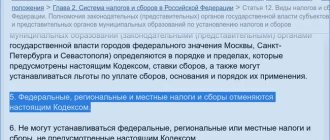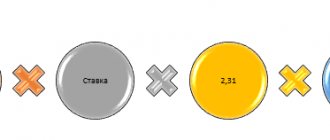Legal aspects of determining the procedure for paying taxes and fees
Timely payment of taxes and fees is one of the main obligations of the tax payer, failure to fulfill which entails bringing the violator to legal liability, therefore the issues of the procedure and conditions for making the relevant payments, calculating their amounts and the timing of this operation are quite relevant.
The procedure for paying taxes and fees, along with the subject and object of taxation, the tax base and the tax rate, is one of the fundamental elements of the taxation system, on the basis of which the tax policy of the Russian Federation is implemented.
What does a single tax payment consist of?
It includes three types of transfers made by a taxpayer who has switched to a special procedure for paying taxes and other payments.
First, funds voluntarily transferred to the appropriate federal treasury account intended for the EPP.
Secondly, taxes, fees, contributions, advance payments, penalties and fines transferred to the budget, which the taxpayer did not regard as STP.
Thirdly, amounts overpaid or overcharged. They will be included in the single tax payment at the moment the overpayment is discovered, but not earlier than the date of transition to the special procedure.
Important
An entrepreneur can list two SNPs. One - on the basis of the norms of Article 45.1 of the Tax Code of the Russian Federation as a “simple” individual (these funds will be used to pay “property” taxes and personal income tax specified in the tax notice). The second is based on the norms of the new Article 45.2 of the Tax Code of the Russian Federation as an entrepreneur (these funds will be used to pay taxes on business income, for example, the simplified tax system). It is impossible to combine these two EPPs into one.
Receive an enhanced qualified electronic signature certificate in an hour
Fundamental principles used in the payment of taxes and duties
The procedure and form of payment of taxes and fees, obligations and rights of payers are regulated by Art. 58 Tax Code of the Russian Federation.
In accordance with the requirements of this rule of law:
- Tax payment made in the proper form is made once and in full. The law allows the transfer of preliminary payments, but they do not have the basic properties of a tax, therefore, violation of the timing of their implementation and the procedure for calculation is not a sufficient basis for bringing the violator to legal liability, in particular administrative liability;
- the taxpayer (tax agent) or his authorized representative must transfer the entire amount of the tax or fee within the period established by the relevant rules of law;
- compliance with the procedure for calculating and paying preliminary payments established by the Tax Code of the Russian Federation is mandatory for tax payers;
- Payments can be made in cash or by non-cash form;
- the procedure for calculating and paying each specific tax is established by the Tax Code of the Russian Federation, as well as by the tax laws of individual constituent entities of the Russian Federation and by-laws of municipal authorities.
Legal relations that arise after the correct calculation and payment by the taxpayer of mandatory taxes and fees, which provides for the proper fulfillment of tax obligations, are regulated by budgetary acts of lawmaking.
When are taxes paid?
Tax regulation in our country is regulated by the Tax Code of the Russian Federation, as well as laws and regulations regarding the regulation of taxes and contributions collected to local and regional budgets. According to Art. 3 of the Tax Code of the Russian Federation, the taxpayer is obliged to pay the taxes and fees established by the Tax Code of the Russian Federation on time and in full.
Tax payment deadline is the date before which the taxpayer must transfer the payment amount for this tax. Otherwise, a fine will follow and penalties will be assessed for non-payment.
For more information, see What You Need to Know About Tax Due Dates .
For individuals, the deadlines for settlements with the budget are indicated in the notifications that tax inspectors send out annually by Russian Post. But organizations and entrepreneurs must independently control the deadlines for paying taxes, depending on the chosen taxation regime and the activity being carried out.
Entrepreneurs have nuances when determining the timing and procedure for paying taxes: payments to the budget for their own property, including those used in business activities (for example, a building or a car), the businessman pays according to notifications from the tax inspectorate, and taxes for business activities must be calculated independently according to tax records.
If you are an individual accountant, then this article will be useful to you.
With its help, you can promptly remind your manager that it is time to pay property taxes.
Methods of paying taxes and fees and features of their implementation
The Tax Code of the Russian Federation establishes several methods of collecting tax, which include:
- payment of tax based on the declaration;
- collection of tax payment from the source of income;
- cadastral method of collecting tax payments;
- collection of tax at the time of sale of income;
- fulfillment of the obligation to pay tax in the process of using property: both movable and immovable.
Let's look at some methods in more detail.
1. Payment of the tax fee according to the declaration.
The tax payment is collected on the basis of the declaration.
The use of this method implies the obligation of the taxpayer to provide the relevant tax authority with information about income received for a certain period.
Information on the basis of which tax is calculated must be submitted in the proper form and within the prescribed period. After the taxpayer has fulfilled his obligation to pay taxes, the body that accepted the payment must provide the payer with a payment notice.
It should be noted that the method of fulfilling the obligation to pay taxes and fees through a declaration is not effective enough, due to the irresponsibility of some citizens and the desire of unreliable taxpayers to evade fulfillment of the obligation. In addition, analysis and processing of the data presented in the declaration requires considerable effort and time.
2. Payment of tax at source of income.
This method is characterized by the following tax collection procedure: the tax payment is withheld from the income of individuals until it becomes their property.
That is, the tax payment is made automatically, which makes it more efficient, unlike the previous method.
3. Cadastral method.
The cadastral method of collecting tax is implemented through the use of cadastral registers (house, land, property, trade and others), containing lists of typical objects of taxation, which are classified according to external characteristics. The cadastral method allows you to determine the average profitability of a particular taxable object.
This method is characterized by the establishment of fixed deadlines, before the expiration of which the taxpayer is obliged to make payments. For example, property tax for individuals must be paid in equal parts in September and October, before the 15th of each month.
What taxes are still paid on imputation?
The UTII payer, in addition to the single tax, must pay other tax payments and fees, because he is exempt only:
- from VAT (except for cases where the obligation of a tax agent arises, the import of goods and the issuance of an invoice with VAT);
- property tax (except for cadastral tax);
- income tax (for organizations) and personal income tax (for individual entrepreneurs).
What payments to the state can still be made by the “imputed person,” as described in the material “How much taxes should I pay on UTII?” . Using this material, it should be borne in mind that from 2022, insurance premiums, which until this year were subject to the provisions of the law “On Insurance Contributions...” dated July 24, 2009 No. 212-FZ and paid to the funds, are paid to the Federal Tax Service.
Obligation of taxpayers to make advance payments
In some cases, tax law establishes the taxpayer’s obligation to make an advance tax payment, the so-called advance payment.
The need to make an advance payment is justified by the need to ensure uniform filling of the budget, which is required to avoid a cash gap.
Features related to the payment of advance payments:
- the procedure for paying the advance payment is similar to that provided for paying the tax itself;
- the obligation to pay the advance payment is considered properly fulfilled if it is fulfilled in the manner prescribed by law;
- Incorrect calculation of the amount of the advance payment and violation of the procedure for its payment are not grounds for bringing the payer to legal liability due to improper implementation of tax legislation.
Responsibilities of representatives of local administration and postal organizations of the Russian Federation
In accordance with paragraph 4, paragraph 58 of the Tax Code of the Russian Federation, postal organizations and local administration bodies must:
1. Accept and promptly transfer amounts of money, the main purpose of which is the payment of taxes and fees, to the budget of the Russian Federation. It should be noted that the collection of fees by the above-mentioned authorities for accepting funds to pay taxes is not provided for by law;
2. Keep records of funds transferred to the budget of the Russian Federation to pay taxes;
3. Ensure that the taxpayer (tax agent) who paid the tax is issued a document confirming the fulfillment of the obligation properly. As a rule, after paying the tax, the payer receives a corresponding receipt;
4. At the request of tax authorities, provide information related to the transfer (calculation) of funds by a taxpayer or tax agent to pay taxes to the state budget.
Why is a single tax payment needed?
Now, when transferring various taxes and contributions, companies and entrepreneurs are forced to issue payment orders separately for each tax and insurance premiums.
When filling out different payments, accountants often make mistakes in numerous details, which, among other things, are constantly changing. As a result, money ends up in “uncleared payments”, and taxpayers end up with arrears. Fill out payment slips with current BCC, income codes and other mandatory details Fill in for free
This situation should be corrected by a special procedure for transferring money to the budget.
Its essence is as follows. The accountant transfers a certain amount to the budget without breaking it down by taxes and insurance premiums. And the inspectorate independently distributes the specified amount towards the payment of one or another tax, fee, contribution, penalty, fine and interest. Corresponding amendments to the Tax Code were introduced by Federal Law No. 379-FZ dated November 29, 2021 (comes into force on January 1, 2022). Help
Individuals can transfer a single tax payment (STP) from 2022 (see “A law has been adopted allowing individuals to pay property taxes in advance”). Later, officials announced a similar scheme for organizations and individual entrepreneurs (see “The Federal Tax Service will introduce a single account for paying taxes”).
Receive an electronic signature to log into the taxpayer’s personal account on the Federal Tax Service website Send an application
Determination of the procedure and deadlines for paying different types of taxes and fees
Calculation and payment of specific taxes are carried out in the manner prescribed by the following regulations:
- in relation to regional taxes, the requirements of acts of lawmaking adopted by the authorized bodies of the constituent entities of the federation are applied;
- calculation and payment of local taxes are carried out on the basis of legal acts of municipal authorities;
- federal tax fees - in accordance with the provisions of the Tax Code.
The law allows a period of one month to fulfill the tax obligation, the expiration of which begins from the moment the taxpayer receives the corresponding notice from the tax service authority.
The exception is when the notice sets a longer period for payment.
Author of the article
Objects of taxation
Small bodies of water can be transferred to private ownership, but rivers, lakes, and seas that have an impact on the overall ecosystem of the state are used by all citizens and organizations on an equal basis and in accordance with the law. Business entities carrying out certain types of activities are required to pay the appropriate fee.
The BCC for water tax in 2022 is indicated when paying a fee for the use of water bodies, which are called “objects of taxation”:
- collection of a resource - water (in this case, the volume is taken into account to calculate the collection);
- use for timber rafting (the amount of collection in this case will depend on the volume of timber harvested and the distance over which it is floated);
- use of a reservoir without water intake for hydropower purposes (the amount of collection depends on the amount of energy received);
- operation of the facility not for the purpose of fence (the amount of the financial obligation to the state is affected by the area used).
Payment is made to the federal budget.
The Tax Code also specifies persons who are not taxpayers and are not required to remit water tax: the CSCs specified in the article are not relevant for them; they pay fees under water use agreements. The parties to such agreements are exempt from the discussed financial responsibility to the state, as well as those persons to whom the objects are provided for use on the basis of decisions of executive authorities.
In accordance with Art. 333.9 of the Tax Code of the Russian Federation, the following persons are not payers:
- whose activities are directly and inseparably connected with water bodies;
- subject to another fiscal charge in connection with the use of facilities;
- carrying out water protection;
- carrying out socially useful activities.






